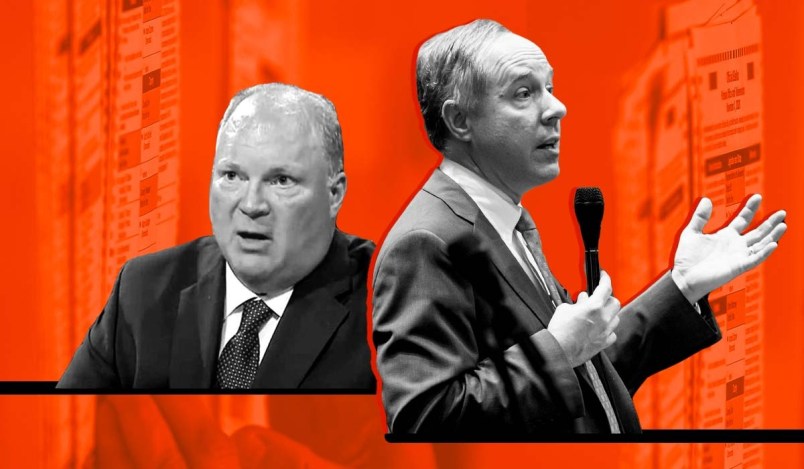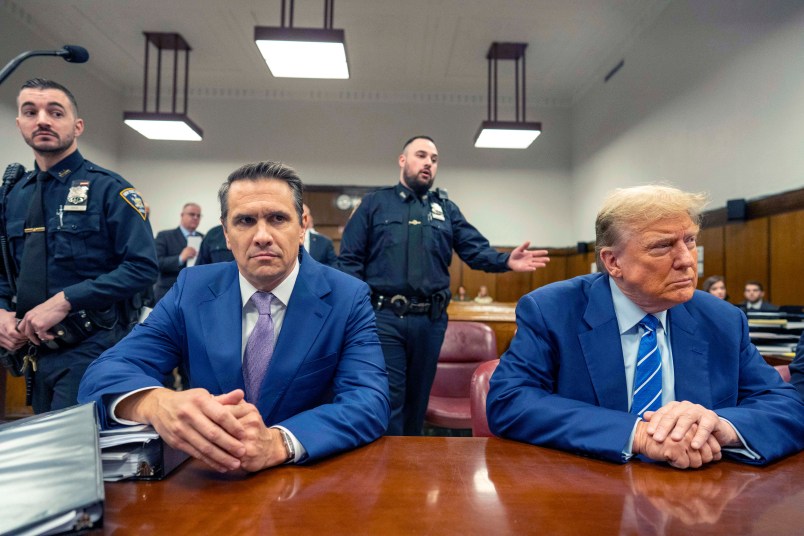Republicans’ attacks on the democratic process didn’t end on Jan. 6 — they’ve just changed form. Throughout 2021 and now continuing into 2022, GOP leaders have pursued endless “audits,” “investigations” and “reviews” of the 2020 election results that stage hunts for non-existent evidence of widespread voter fraud and keep former president Trump’s lie of a stolen election alive.
Coincidentally, the reviews have largely been launched in battleground states with Republican elected officials eager to take on the task: Arizona, Pennsylvania, Texas, Michigan. But as the anniversary of the attack on Congress arrives, one state is at the head of the pack: Wisconsin.
Joe Biden won Wisconsin by around 21,000 votes in 2020, a slim margin that infuriated Republicans. Now, they’re pitching big changes to the state’s election system while furiously spinning up new efforts to undermine Wisconsin voters’ faith in the democratic process.
“This has gotten worse, not better,” said Michael Wagner, a professor at the University of Wisconsin-Madison’s School of Journalism and Mass Communication whose research focuses on the functioning of American democracy. “I think we had a moment a year ago to try to push the reset button on how we think about democratic elections, and instead, we kept playing.”
At the forefront of Wisconsin Republicans’ attacks on the 2020 results is Michael Gableman, the former state Supreme Court justice tasked by the GOP-controlled legislature with leading an investigation into various claims of voter fraud and misconduct by election administrators.
Gableman’s investigation has shifted gears a few times, but his underlying themes are clear: Something is fishy with the 2020 election results, and anyone who doesn’t want to take part in the latest investigation is hiding something.
“What are [the Wisconsin Elections Commission] and the recalcitrant city clerks hiding from the public and our legislature?” he wrote in November. Fears of widespread voter fraud, he added later, “may be well-grounded.”
A year earlier, in November 2020, Gableman said that the election commission had been allowed to “steal our vote.” Now, as part of his investigation, he just subpoenaed the Democratic chair of that commission for “any and all communication” with election officials since January 2020 — after previously threatening to jail two Democratic mayors if they didn’t cooperate with him. Separately, he endorsed the leading Republican candidate for governor last month.
Gableman was initially scheduled to wrap up by the end of 2021. But that deadline has come and gone, and state Assembly Speaker Robin Vos (R) — who announced Gableman’s hiring at the state GOP convention in June — has indicated he wants to keep the investigator around for an unspecified period of time. Gableman suggested to a Republican political gathering last month that he was only just getting started.
‘We Need Our Own Irate Hooligans’
The key players in the state’s Republican election denial scene haven’t tried to hide their feelings about the 2020 vote.
Vos, for one, has said five members of the election commission should “probably” be criminally prosecuted for changes to nursing home election rules they made before the 2020 election.
The investigators on Gableman’s team include a county GOP chair who unsuccessfully sued to overturn the last election and a former Trump administration official who wrote in April, “the 2020 presidential election was stolen, fair and square.”
The former Trump official, Andrew Kloster, now a Gableman investigator, added: “We need our own irate hooligans (incidentally, this is why the left and our national security apparatus hates the Proud Boys) and our own captured DA offices to let our boys off the hook.”
The investigatory work, despite its legislative funding and high profile, has been sloppy: Recent subpoenas from Gableman to the IT departments in Madison and Green Bay include numerous typos and request information about communications with Dominion Voting Systems — even though neither county uses those machines, the Milwaukee Journal Sentinel reported.
And a separate, August document request to two counties from State Rep. Janel Brandtjen (R), another vocal skeptic of the last election, appeared to have been copied, word for word, from requests sent by a Pennsylvania state senator and Trump ally who was pursuing his own sideshow at the time.
Nonetheless, the Wisconsin efforts have become the latest cause célèbre for election truthers.
“It’s made it convenient for people who want to doubt the election to cling to that — and that was part of what motivated the insurrectionists,” said Barry Burden, director of the Elections Research Center at UW-Madison.
There have been isolated voices of Republican dissent: State Sen. Kathy Bernier, who chairs the Senate’s election committee and is a former county clerk herself, once celebrated Vos’s efforts, but last month referred to the constant “drumbeat” about massive voter fraud as a “charade.”
“There is no evidence of intentional malfeasance, no evidence that the election in 2020 wasn’t accurate,” she said
She described the Gableman investigation as politics, not policy, influenced by “the pressure from Donald Trump.”
Gableman, undaunted, called on Bernier to resign.
‘I Wouldn’t Say They Are Conspiracy Theories’
The stakes couldn’t be higher: Gov. Tony Evers, a Democrat, has so far vetoed Republicans’ efforts to change election laws in the state, but he faces a tough reelection battle in 2022, when Republicans are sure to make an issue of the last presidential election.
Republicans’ gubernatorial candidate, Rebecca Kleefisch, has herself sued the state’s election commission, and multiple GOP secretary of state candidates have said they want to give the secretary’s office more authority in election administration going forward.
As Gableman’s investigation spills into 2022, it’s likely to become an issue in state-level races, where Republican candidates have already begun messaging their attacks on 2020 election results.
“People will never have full faith in the results if the rules of the game are not enforced,” Kleefisch said in a November YouTube video announcing her lawsuit against the election commission.
Wagner, the UW-Madison journalism professor, called Republican politicians’ focus on voters’ doubts about the election a “briar patch problem” — conservative political elites projected uncertainty about the election results, then their supporters followed their lead, “then the lawmakers say, ‘Look! The public has questions about the election!’”
Vos exemplified the pattern last month, when he rejected the “conspiracy theory” label for people who believe the last election was stolen. They were, after all, just asking questions, he explained.
“I think people put ideas forward, sometimes they are proven to be true, sometimes they are not proven to be true, but I wouldn’t say they are conspiracy theories,” Vos said. “Because, especially early on, many people felt — and probably still a sizable number in the country — feel that the election was stolen.”
Wagner said the potential changes to Wisconsin’s election system, matched with Republicans’ refusal to accept the legitimacy of the last election, spell trouble.
“It’s not crazy to suggest that what’s happening here is the laying of groundwork to certify a false election result,” he said.










